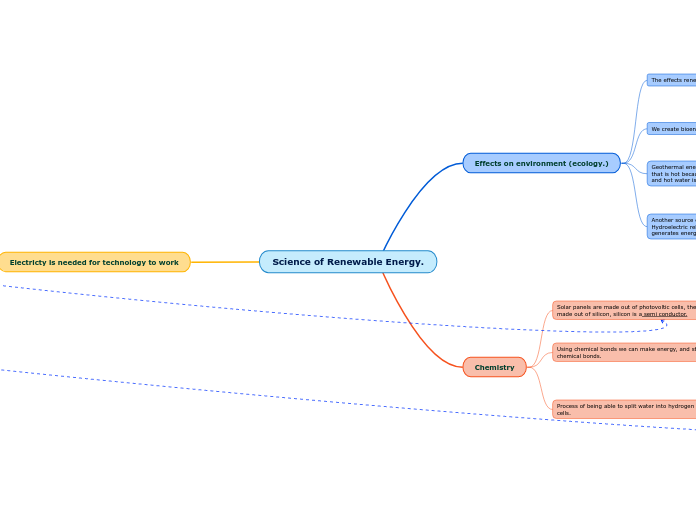door Riley Wong 4 jaren geleden
293
Science of Renewable Energy.

door Riley Wong 4 jaren geleden
293

Meer zoals dit
lightning is a spark of electricity, and is caused when all the positive,lighter, particles move to the top of the cloud and all the negatively charged, heavier, particles move to the bottom of the cloud. The ground has a more positive charge. So when the negative charge grows large enough in the cloud lightning strikes the ground. The lightning strikes the ground carrying electrons, the ground has its positive particles move upwards. So negative particles move in a channel, lightning, towards the ground and positive particles move into elevated objects. The lightning zaps that object and discharges.
The electric charge is grounded, grounding is the transfer of electrons between a charged object and a neutral object to neutralize the object. In this instance the neutral object is the earth and the charged object is bolt of lightning that comes from the cloud, the lightning strikes the ground and transfers the electrons to neutralize the cloud.
Electricty can also be stored in batteries, which supplies smaller amounts of electricty. it is a more short term energy, and usually used for portable devices.
The energy in wall outlets can be used for many things, powering devices, being able to turn the lights on and more.
Turning on the lights requires a circuit.
When we add an electrical current to the water, the ions in the water start moving towards the electrolyte with the opposite charge, where either hydrogen or oxygen is produced.
For example gallium atoms are used because they have 1 less electron than that of silicon. leaving a lack of electrons.
So when sunlight hits the solar panel, the electrons go to the atoms of silicon and gallium mix, since they lack electrons, which generates more electricity.
For example, some aquatic animals might get pulled in to the dam, which disrupts the food chain if one animal is missing, because then one animal won't have something to eat resulting in them dying to starvation and their predators dying from starvation. It also affects migration patterns of aquatic animals. For example salmon like to migrate during a certain time of the year to make babies then they go back to where they came back from. A dam can be a barrier for their migration. Then the salmons can't make their babies and the salmons in the area will die out.
biomass is any organic material that has absorbed sunlight.
renewable source of energy, it does not emit greenhouses gases. But it can hurt the environment if we take too much biomass and destroy habitats for it. So if we just use crops we grow it won't hurt the environment.
Example: Wood and crops.
Green house gases affect climate change and global warming.
Global warming and climate change affect the ecosystems of animals.
Ocean becomes more acidic and sea animals die because of it. The shells of aquatic animals dissolves then they die and their predators have nothing to eat. So then the food chain gets messed up.
So if we reduce our emissions the ocean will stay healthy and be able to continue to eat sea food..